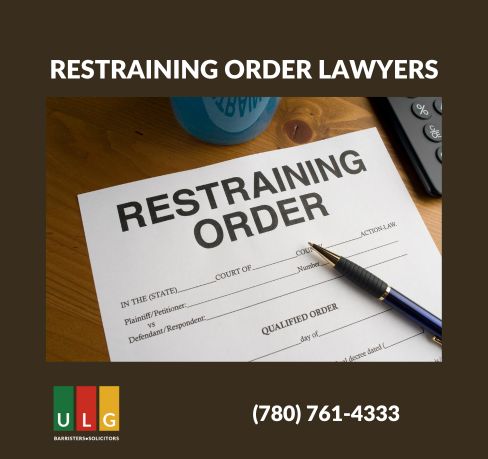Restraining orders are crucial legal tools designed to protect individuals from potential harm or harassment. In Edmonton, Alberta, these orders are often sought in the context of family law disputes, particularly where domestic violence, threats, or harmful behavior are at issue. At Ulasi Law Group, a family law firm based in Edmonton, the team of dedicated professionals helps individuals navigate the complexities of restraining orders with a clear focus on securing safety and justice for their clients.
What is a Restraining Order?
A restraining order is a legal document issued by the courts that places specific restrictions on an individual’s behavior toward another person. In the context of family law, this often applies to cases of domestic violence, emotional abuse, stalking, or situations where one party feels threatened by the other. The purpose of a restraining order is to prevent further harm and ensure the safety of the person seeking protection.
In Edmonton, restraining orders are governed by both the Alberta Family Law Act and the Criminal Code of Canada, depending on the nature of the case. The Family Law Act allows for restraining orders in civil family law matters, while the Criminal Code addresses situations that may involve criminal charges, such as assault or harassment.
Types of Restraining Orders in Alberta
There are several types of restraining orders available in Alberta, each designed to address different situations. Ulasi Law Group assists clients in understanding and pursuing the appropriate order based on their unique circumstances. The primary types include:
Emergency Protection Orders (EPOs)
- Purpose: An EPO is a short-term order granted to protect individuals who are in immediate danger of family violence.
- Process: These orders are granted on an urgent basis, often without the need for the alleged offender to be present (known as an ex parte application). The court considers the risk of harm and the urgency of the situation.
- Duration: EPOs typically last for a short period, often less than 30 days, after which a court hearing is held to determine whether further protective measures are necessary.
- Enforcement: EPOs are enforceable by law enforcement, meaning the police can arrest someone who violates the order.
Restraining Orders
- Purpose: A standard restraining order is a longer-term protective measure that can apply to both family and non-family situations. It is designed to prevent contact or harassment from another individual.
- Process: Unlike EPOs, restraining orders may not require an immediate risk of harm. However, the applicant must still demonstrate to the court that they are in need of protection due to a credible threat or ongoing harassment.
- Duration: Restraining orders can be granted for extended periods and are often renewable if the threat persists.
- Enforcement: Like EPOs, restraining orders are enforceable by police, and violation can lead to criminal charges.
No-Contact Orders
- Purpose: These orders are typically issued in criminal cases where one person is charged with an offense involving violence or harassment. A no-contact order prohibits the accused from communicating with or approaching the victim.
- Process: These orders are typically granted by a criminal court during bail hearings or sentencing procedures.
- Duration: No-contact orders remain in place until the conclusion of the criminal proceedings, and can be extended as part of probation or sentencing.
Peace Bonds
- Purpose: A peace bond is a preventive court order under the Criminal Code of Canada, designed to prevent someone from committing a crime. It requires the person to “keep the peace” and follow certain conditions, such as avoiding contact with specific individuals.
- Process: A peace bond does not require an immediate threat of harm, but the applicant must show that they fear for their safety or property.
- Duration: Peace bonds typically last for one year, and violations can result in criminal charges.
How to Obtain a Restraining Order in Edmonton
If you are seeking a restraining order in Edmonton, the process generally involves several key steps:
- Filing an Application: The first step is to file an application with the court. This application must include details of the relationship between the parties, the nature of the threat or harm, and any evidence supporting the claim. The Ulasi Law Group team assists clients in preparing thorough and compelling applications to ensure their concerns are clearly articulated to the court.
- Ex Parte Hearing (If Applicable): In cases of immediate danger, the court may grant an ex parte hearing, where the applicant is allowed to present their case without notifying the other party. This is common in situations involving domestic violence, where the applicant may be in urgent need of protection.
- Court Hearing: After the initial application, the court will schedule a hearing where both parties can present their side of the story. The court will consider the evidence, including witness testimonies, police reports, medical records, and any previous history of violence or harassment.
- Issuance of the Order: If the court is satisfied that the applicant requires protection, it will issue a restraining order. The order will specify the terms of protection, including restrictions on contact, proximity, and any other conditions deemed necessary for the safety of the applicant.
- Enforcement: Once issued, the restraining order is enforceable by law. If the other party violates the terms of the order, the police can intervene, and the violator may face criminal charges, including arrest and imprisonment.
Why You Need Legal Assistance from Ulasi Law Group
The process of obtaining a restraining order can be emotionally and legally complex. It requires a deep understanding of family law, a careful presentation of evidence, and often the ability to respond to opposition from the other party. The legal team at Ulasi Law Group specializes in handling these delicate matters with the sensitivity and expertise required to protect their clients’ rights and safety.
Here’s how Ulasi Law Group can assist:
- Comprehensive Legal Advice: The lawyers at Ulasi Law Group provide clear, strategic advice on the best type of restraining order for each client’s unique situation. Whether the threat is immediate or part of an ongoing issue, they guide clients through the legal process with confidence.
- Filing and Representation: Ulasi Law Group takes care of all the paperwork and represents clients in court, ensuring that every step is handled with professionalism and precision. They understand the importance of presenting a strong case, backed by evidence, to persuade the court that a restraining order is necessary.
- Ongoing Support: After obtaining a restraining order, the lawyers at Ulasi Law Group continue to support their clients, ensuring they understand their rights and the enforcement mechanisms available. If the order is violated, they provide swift legal recourse to protect their clients’ safety.
Final Thoughts
Restraining orders are a critical safeguard for individuals facing harassment, violence, or threats. In Edmonton, Alberta, navigating the legal system to obtain a restraining order requires both legal expertise and emotional support. Ulasi Law Group is dedicated to providing clients with the guidance and advocacy they need to secure their safety and peace of mind. If you or someone you know is in need of a restraining order, reaching out to a family lawyer is the first step toward protection. With their commitment to justice, Ulasi Law Group ensures that your voice is heard and your rights are defended.
By partnering with a skilled legal team, you can take control of your situation and protect yourself and your loved ones from harm.

